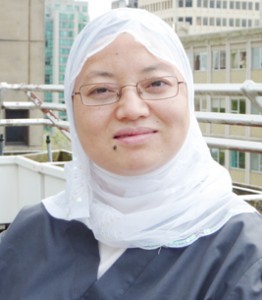Unions support education and training
Name: Huifang Min
Occupation: St. Paul’s Hospital Dialysis Unit
Union: BCNU
Huifang Min says that her union serves as the basis for her profession. She also credits the British Columbia Nurses’ Union for defining her role in the workplace, explaining what her rights and responsibilities are as a nurse in British Columbia.
Huifang was originally hired at St. Paul’s as an IV therapist in 2007. She was delighted to learn that her employer and union would provide her with bursaries to pay for tuition, books and salary replacement. This enabled her to complete her renal certificate specialty degree to work with dialysis patients. She was the recipient of St. Paul’s Hospital’s Education Award for her dedication and hard work to upgrade her skills and knowledge.
As a little girl growing up in Northwest China, Huifang used to dream about being a nurse. Living across the street from the local hospital, she was inspired by the nurses’ trademark white uniforms and head coverings. The nurses she saw were known as “White Angels” and a high degree of respect was conferred to these women, for whom limited career paths were available. She understood even then the recognition that nurses received for their vital contribution to society. Her father saw in Huifang the will to care for those in need and the desire “to support the spirit of other human beings.”
Huifang hails from a city in China’s northwest close to Mongolia and Nepal where up to one third of the population is Muslim. People in this area are very traditional and some ethnic minorities still lead a nomadic life on horseback. Huifang is happy to note that “I am still able to practice my religion when working in a Catholic hospital.” Colleagues pointed out the facility’s Meditation Room which she found to be the perfect place to pray during her breaks, returning to her shift refreshed.
Huifang lived and studied in Kuwait for ten years after leaving China, but she longed to live and work in a country that was willing to eventually make her a citizen. Canada presented itself as a place where she could further her professional development in a country with an advanced healthcare system. She notes that “both the employer and the union support your development here. I really appreciate BCNU’s role in supporting me. Such opportunities are not really available anywhere else.”
Asked what she loves about her job, Huifang says “from the bottom of my heart, I feel I am the one supporting vulnerable people. When patients need help, we are there. We don’t expect them to show their appreciation. We get satisfaction from doing our job for people at their most disadvantaged points.”
